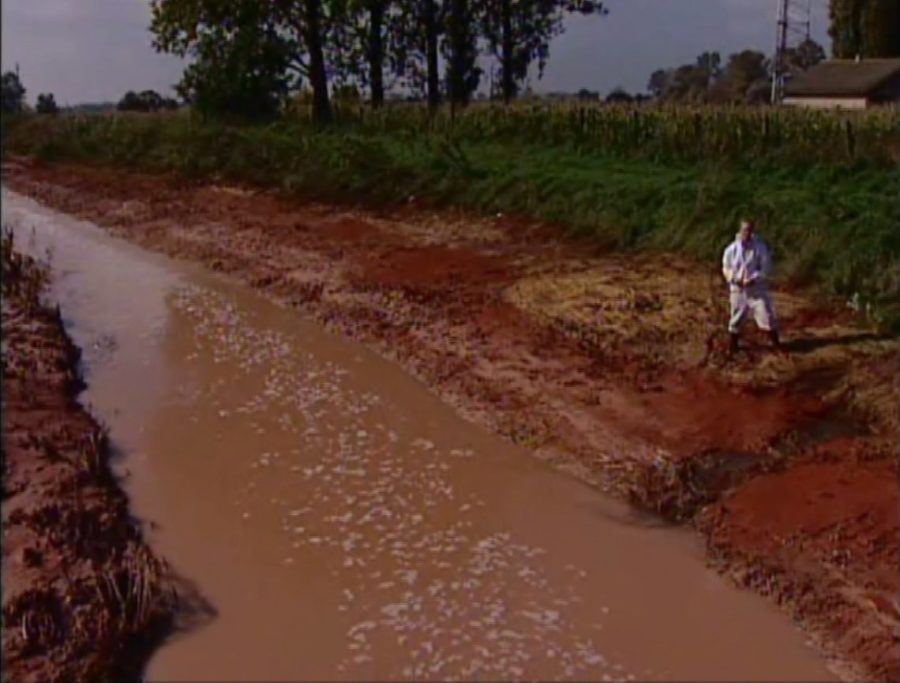Wall collapse could lead to second wave of toxic sludge in Hungary
Photo: Luis Graham Youll/CNN Wire Service
Toxic sludge fills the Danube River in Hungary. The spill, stemming from a cracked reservoir at an aluminum plant has killed seven people and injured more than 100. Officials estimate the wall could fail and release a second wave of sludge into the river.
October 10, 2010
Residents were evacuated and soldiers were on standby Sunday, Oct. 10 as authorities believe a damaged reservoir wall may unleash a second wave of toxic sludge onto a Hungarian village, an official said.
The cracked wall is expected to collapse, said Gyorgi Tottos, spokeswoman for Hungary’s Catastrophe Protection Directorate. “We know that it will happen,” she said, although when is unknown.
Some 8,000 people have been evacuated from the village of Kolontar, leaving it essentially empty, she said. Hundreds of soldiers were at the ready to rescue inhabitants of a nearby village when the wall collapses.
A 19-inch crack has developed in the wall of the aluminum plant reservoir. If the wall collapses, 500,000 cubic meters of toxic red sludge could spill out. That’s about half the amount that spilled on Monday, inundating Kolontar and two other villages. Seven people were killed and more than 100 injured.
Hungary’s state-owned MTI news agency quoted Zoltan Illes, state secretary of environment, as saying the damaged wall could not be saved. Specialists had tried to reinforce the wall on Saturday, Oct. 9.
Hungarian Prime Minister Viktor Orban, who was visiting the stricken area Saturday, said it was “very likely” the reservoir wall will collapse.
“It’s in very bad shape, and our estimation is that that wall could fall down,” Orban told reporters in the town of Ajka. “One consequence is that human lives could be in danger. That’s the reason why we pulled out … all human lives from that area, in order not to have more loss in human life.”
The sludge from Monday’s spill reached Europe’s mighty Danube River on Thursday, Oct. 7, raising fears of wider contamination in Hungary and countries downstream, including Croatia, Serbia, Bulgaria, Romania and the Ukraine.
But water test results released Friday, however, indicated the sludge may not harm the Danube after all. The pH, or acidity, level of the Danube water was 8.5 on Friday — slightly above normal but not dangerous and able to sustain life, Tottos said.
Readings of pH range from 0 to 14. Levels lower than 7 characterize acids, and levels higher than 7 denote bases; highly acidic or highly basic water can harm living things. The 8.5 pH level and fast-moving currents made officials optimistic that a natural disaster can be avoided, Tottos said.
However, on Sunday she said that while saving lives is the priority, officials remain concerned about the long-term effects of the spill and want to protect Europe’s waterways.
But, she said, it’s too soon to tell what the long-term effects might be. “What happened on Monday has never happened before in Europe, so we will see,” she said, “and we will try to avoid a bigger new catastrophe.”
The environmental disaster occurred near Ajka, nearly 100 miles west of Budapest. The sludge covered the villages of Kolontar, Devecser and Somlovasarhely, in some places reaching several feet high, leaving dead animals such as fish and frogs in its wake.
The aluminum company, MAL Co., said in a statement Saturday that it was doing its utmost “to avoid further damanges and to reinforce the injured deposit.” The company maintains it has performed extensive maintenance work and renovations in the past decade and had followed safety regulations.
The company was working to construct dams and defense lines in an attempt to minimize damage, it said. It also has established a relief fund for victims of the spill and was attempting to help in finding accommodations for evacuated people. More than 1,100 residents of Ajka and the surrounding towns are MAL employees, it said.
Orban warned Saturday of the “toughest possible consequences” for those responsible for the spill and said human error was the cause.
“Behind this tragedy, some human errors and mistakes must exist,” he said. “We will reveal all of that, and the consequences will be very serious — as much as you can imagine.”
The exact chemical composition of the sludge has not been revealed, but aluminum processing normally involves compounds that include cyanide, cadmium and chromium.
Emergency workers have been pouring plaster and fertilizers on the sludge in hopes that it will counter its alkalinity. Dust from sludge that dries may also pose a threat, Hungary’s Interior Ministry has said. It said some workers involved in damage cleanup may need filtering masks.
— CNN’s Bharati Naik and journalist Flora Hevesi contributed to this report.







